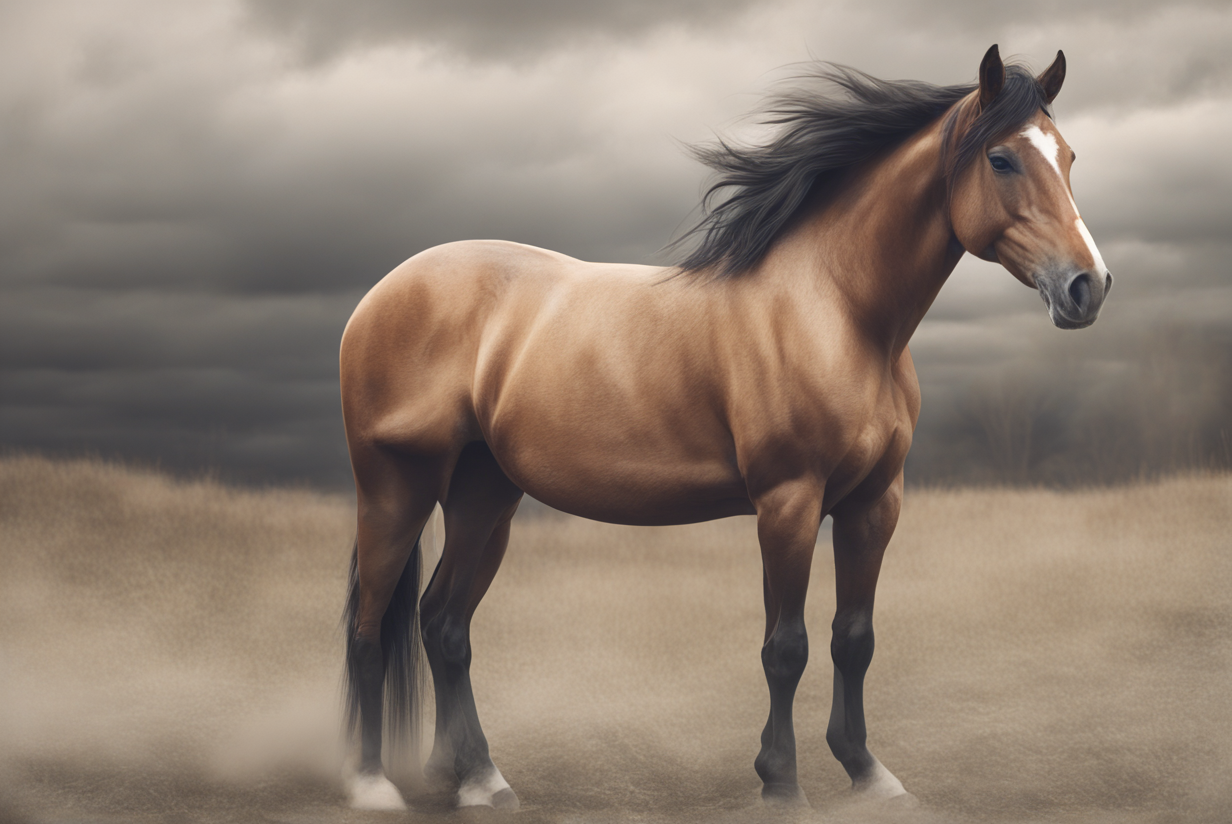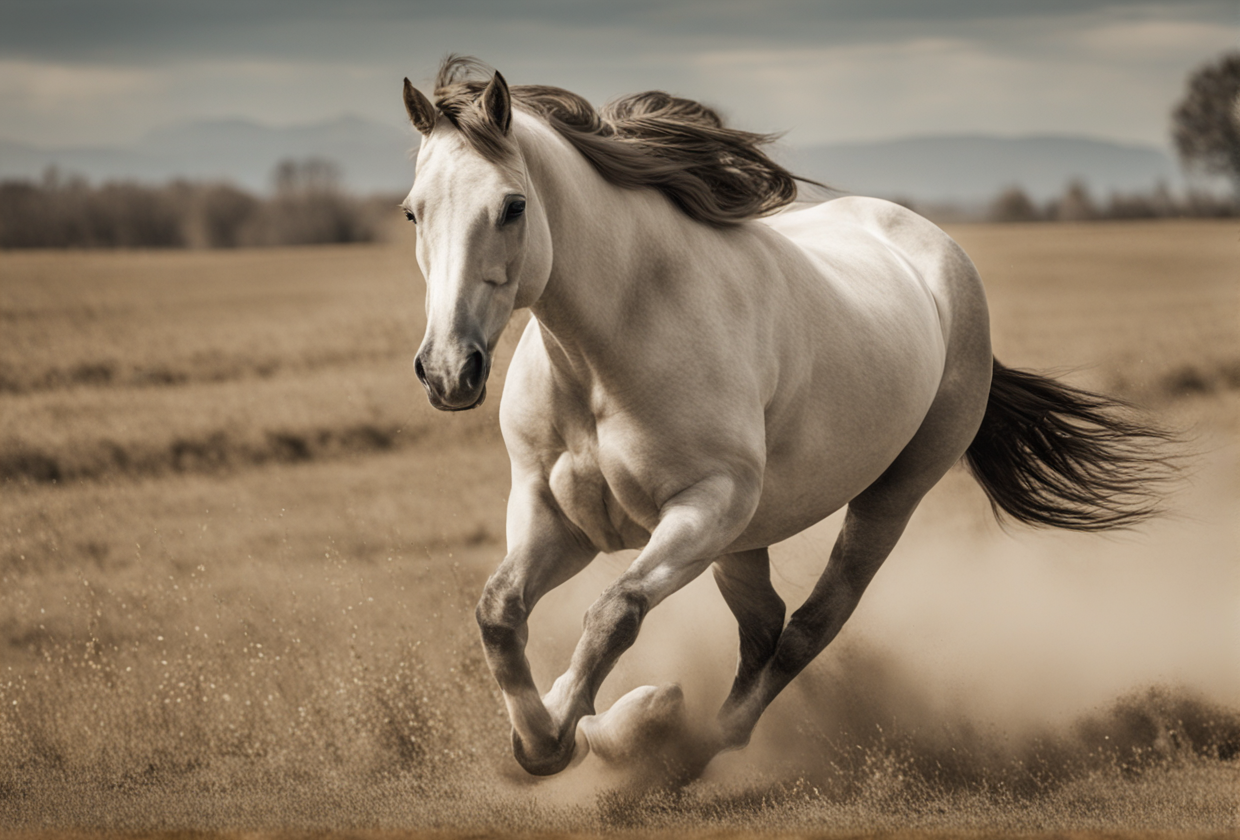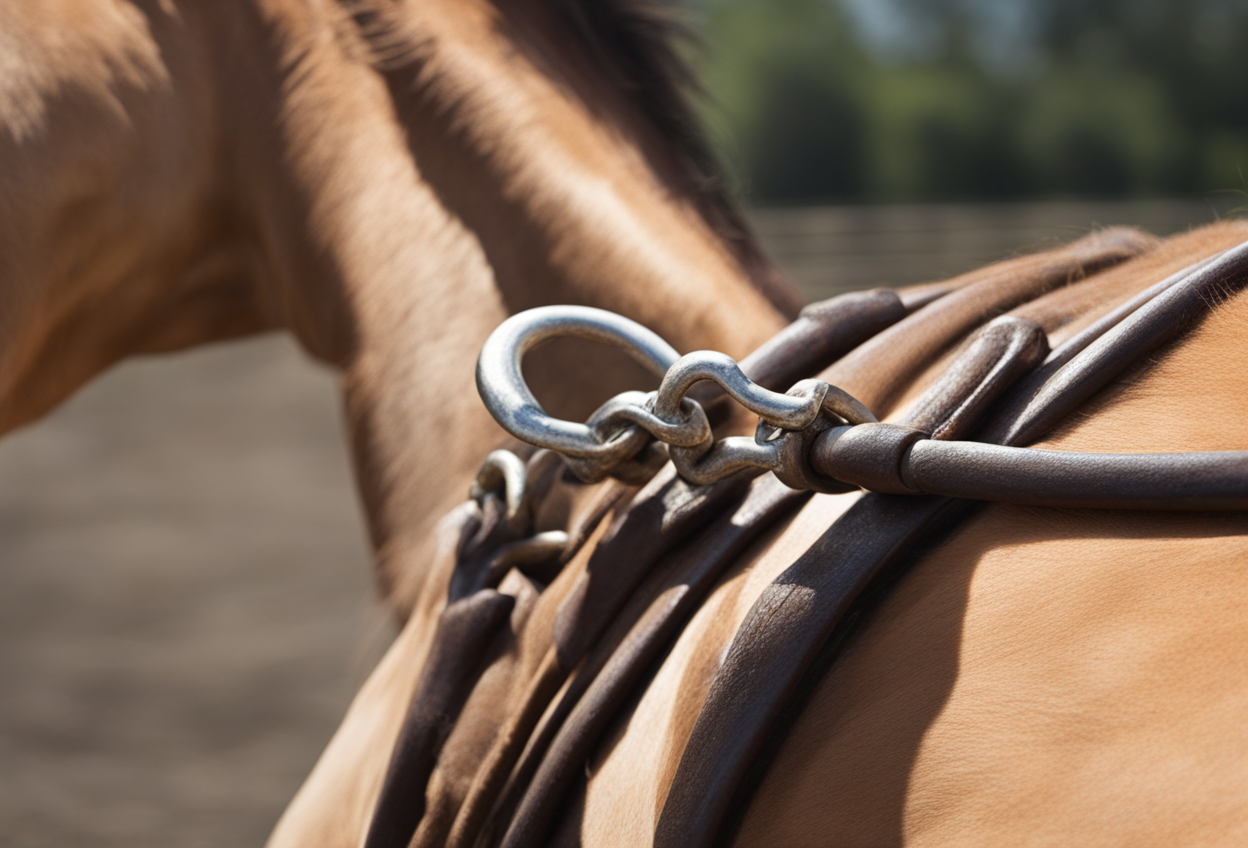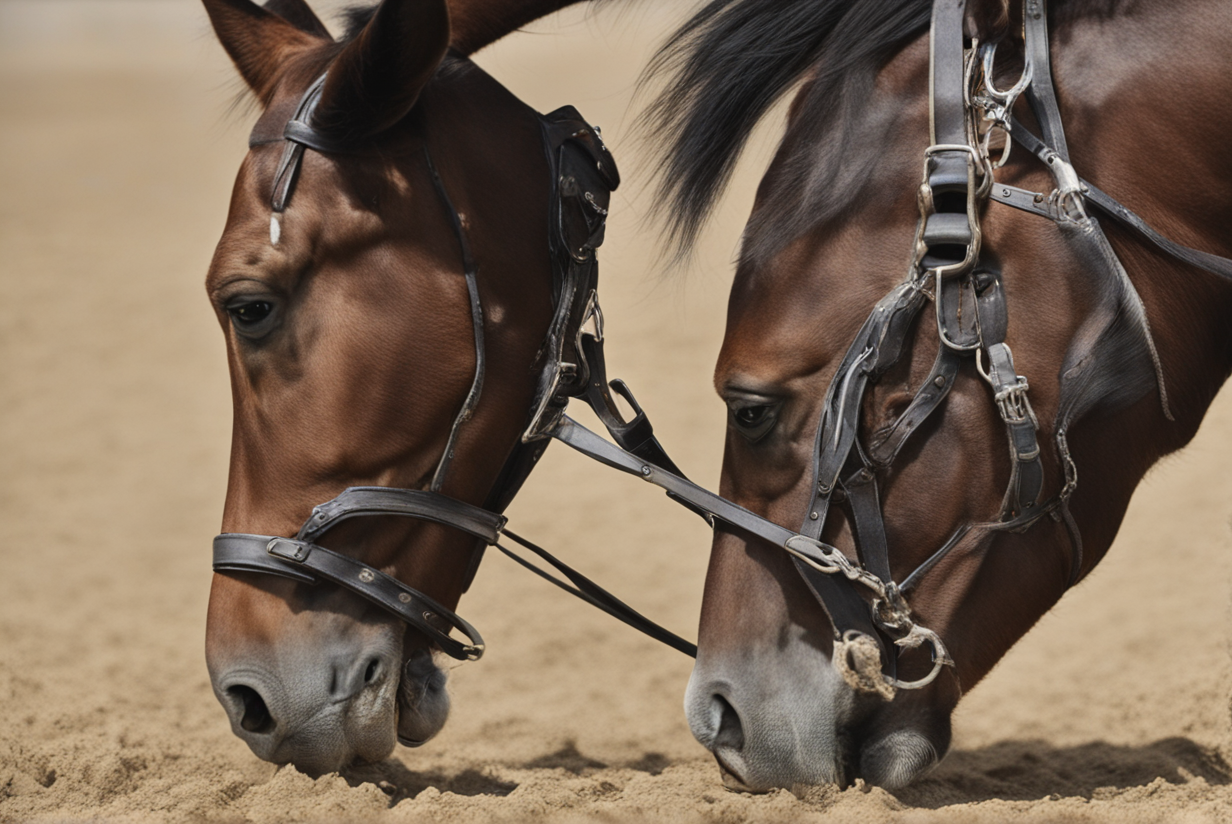I’ll never forget the first time I saw my horse Sky chomping away at her bit like there was no tomorrow.
At first I thought she was just being ornery, but it got me wondering – what exactly is going on inside that horse brain when they do that?
Turns out there’s actually some good reasons why our equine friends like to gnaw on the reins from time to time:
Table of Contents
Reason #1: It’s a Calming Behavior

Much like how some folks nibble their fingernails when they’re feeling anxious, horsey chomping is actually a self-soothing thing for them.
When they’re feeling stressed about something, like maybe it’s their first time at a rodeo or there’s loud noises at a parade, they’ll start grinding their teeth on the bit.
The steady pressure on their gums and tongue helps calm their nerves the same way sucking your thumb might calm a kid down.
They can feel more in control of the situation when they’re the ones applying pressure to their mouth instead of it being caused by something scary outside of them, like screamin’ kids at a school field trip.
It’s like hugging a teddy bear – that lil oral action is soothing and comforting.
I’ve seen mares chomp like crazy when a loud truck goes rumblin’ by during turnout, but as soon as the noise passes they settle right down and stop gnawing.
The bit is kind of like their security blanket. They know as long as they’ve got something to clench down on, they’ll be alright.
Reason #2: Boredom or Frustration

Ever been waiting around doing nothing for so long that you started fiddlin’ with something just to pass the time?
Same thing happens to horses if they’re stuck standing in one spot too long without any mental or physical stimulation.
Like if ol’ Paint’s been tied in the barn aisle all afternoon with nothin’ but sweaty hayracks and dusty saddles to look at.
He’ll get so bored that chewing on the bit is more entertaining than counting the number of boards in the wall for the hundreth time.
Horses also get frustrated real easy if they want to eat but can’t. Like if you’re keeping them from grazing in the pasture to train for a show.
With no grass to nibble, that bit starts looking pretty tasty! It gives their mouth something to do besides think about all the yummy weeds they’re missing out on.
Reason #3: They’re Seeking Attention

Pets are clever critters – they figure out quick which behaviors get a response from their people.
For some ornery equines, excessive chomping is one way to get you running over like “What’s wrong boy?! Are you ok??”
It’s like how dogs will whimper pitifully just to have their humans fuss over them.
The second that bit starts clanging against the metal of the bridle though, they know you’ll be right there giving their forelocks a scratch.
One of my geldings Trooper is a major drama queen. If he thinks I’ve been ignoring him too long in the pasture, he’ll spin in circles chomping as loud as can be until I come check on him.
That darn horse just can’t stand not being the center of attention!
Reason #4: They’re Teething

Any parent knows the struggle that is teething babies – the excessive drooling, chewing on everything within reach, and constant fussiness.
Well teething foals are no different, except instead of toys they’ve got halters, lead ropes, and bits to slobbery all over.
As those widdle baby teeth start wiggin’ loose and new big ones push through the gums, a foal’s natural reaction is to chew-chew-chew on anything handy.
At my friend’s horse farm, I’ve seen the weanlings gnawing so hard on their halter leathers you’d think they were cured beef jerky!
And since the bit often the only thing in a baby horse’s mouth while being led or worked with, it’s the perfect teefing target.
All that nibbling helps soothe their achy gums and helps the new chompers cut through. Kinda like teething rings for human babies!
Reason #5: Relief from Pain or Discomfort
If you’ve ever had a toothache, you know that grinding pressure can feel soothing on a sore mouth.
Same is true for horses dealing with dental issues like sharp points on their molars or swollen gums from an abscessed tooth.
The steady pressure of gnawing might help numb things a little bit.
Horses can also get aches and pains in their jaw joints or face muscles just like people do.
I’ve seen arthritic old boys chomp almost non-stop some days when the weather’s causing a flair up in their bones.
The motion seems to loosen things up and help them feel a bit better, kind of like when you crack your own knuckles.
Reason #6: It’s a Habit
Behaviors can become habitual for horses without them even meaning to.
Once they learn that chewing relaxes them during scary events or gets them attention from their people, it can be hard to kick the chomping even when it’s no longer serving a purpose.
Like how some folks will twiddle their hair or bounce their leg without realizing.
One mare I know will gnaw for England whether she’s being ridden, leading or just hanging out in the pasture.
She’s been doing it so long it’s just second nature, even if she’s not upset or bored anymore thanks to the behavior being reinforced for years.
Habits are tough to break once they’re ingrained like that!
Reason #7: They’re Exploring
Kids put everything in their mouths, and young horses do much the same in their exploring puppy phase.
Foals will chew on rocks, sticks, saddle pads – you name it just to experience different textures.
A baby’s bit is a whole new thing to get to know orally since they’ve never had metal in their mouth before. So it gets thoroughly tasted and tested.
They try biting it, sucking it, scraping it with their teeth just like little kids mouthing toys.
It’s all part of learning about their environment through their senses. And that bit might as well be the latest chew toy to them!
Reason #8: They Want to Graze
As cattle cud and regurgitate grass all day, horses evolved as continual grazers always on the lookout for more fodder.
They’ll naturally spend 12-18 hours a day nibbling and cropping plants in the wild, y’all.
So when a horse is being asked not to eat while being ridden or worked, that constant grazing instinct can kick in hard.
All that chomping and grinding is what they do while foraging, so in some ways it stimulates grazing behaviors when they don’t have any vegetation on hand.
So the bit might remind them of crunchy grass stems or leaves in their mouth, even it ain’t vegetarian-friendly at all.
Reason #9: It Tastes Good
Crazy as it seems, some horses seem to really enjoy sucking on that metal bit like a jawbreaker.
Just like people will chomp gum for hours, I think certain horses actually like the funny taste.
We all know some kids who’ll suck on pennies ’til they’re shinier than a new dime. Same kinda thing, I reckon.
When Sky was a foal she’d suck so hard trying to nurse from the bit that she rusted it all to heck!
Can’t say I understand the appeal myself, but she musta thought that iron had some flavor.
Every horse is different, but for some the bit is simply satisfying to gnaw on like a tasty chew toy.
Reason #10: They’re Seeking Control
Being herd animals, horses are all about the pecking order and who’s in charge.
Some will try to claim a higher rank by exhibiting dominant behaviors like nipping, kicking or barging other horses.
Chewing forcefully on the bit can be one horse’s subtle way of saying “I’m the boss around here, got it?”
By applying pressure to your hands and mouth via gnawing, they’re flexing their powerful jaw muscles as a reminder not to mess with them.
It puts them in control of the dynamics instead of the rider.
Sassy mares especially will try and take the leading role, so chomping hard on a working student lets them feel big and strong.
Reason #11: They’re Flexing Their Jaws
All that grinding and crunching is a real jaw-sizer for equines.
It flexes and builds muscle in their facial region much like we do shoulder rolls to loosen up.
The repetitive motion keeps their teeth and cheeks in tip-top condition too since wild horses spend all day grinding forage.
Have you seen a horse really chomping away? Their whole head will bob up and down as they clench hard.
It’s like their personal dental workout to feel limber and capable of grabbing big mouthfuls of grass all day long.
Reason #12: They’re Communicating
The grinding of teeth carries through horse’s sensitive lips and nose.
They can sense vibrations from other horses chewing even if separated by fences.
Chomping allows them to “talk” without being face-to-face, like gossiping on the phone.
Horses separated in different pastures will sometimes chomp in sync, almost like they’re having a conversation.
It’s one of their main ways of socially interacting as a herd since they spend so much time grazing apart.
Reason #13: It’s Genetic
Like certain dogs being bred as herders or hunters, some horse lines are predisposed to behaviors.
If a mare was a chronic chomper, her foals may exhibit the same tendency due to her inborn traits.
Genetics play a part in whether a horse has a nibbling, non-biting or strong-mouthed personality.
Breeds like mustangs and Arabians do seem to chomp more often compared to plainer Quarter Horses.
So the chip may not fall far from the block when it comes to bitey horses!
Reason #14: They’re Trying to Suck or Chew
Like how human babies suckle fists for comfort long after nursing,
Some weanlings can’t kick the sucking reflex and will try to nurse off anything in their mouth.
The bit gets chosen by mistake since they’re too young to know better.
Other horses just have a deep-seated need to chew without being able to graze freely.
So the bit fills that oral gratification of something to bite down on.
Reason #15: Stimulating Their Senses
Horses rely heavily on touch, taste, and feel to understand their environments.
The varying textures of grass, dirt, and other bridles stimulate their sensitive mouths.
Chomping on different bits engages those tactile senses much like humans fiddle with objects.
Rubber bits have a squishier feel while rough-cast feels prickly on their lips.
It’s a way for them to experiment orally and learn without even realizing.
Reason #16: Coping with Stimuli
Loud saddle racks or rowdy riders can overwhelm a horse’s senses.
Biting down gives them something constant to focus on amid chaos.
It’s a self-soothing mechanism to block out scary things externally.
The pressure grounds them so they don’t feel so on edge.
It calms their nerves similar to deep breathing for humans in stressful times.</
Reason #17: Encouraging Circulation
All that grinding gets blood pumping to their faces and mouths.
It’s a natural form of physical therapy for horses who don’t grimace.
Better blood flow eases tension and swells which can cause bit pain.
The motion may also relieve headaches or flu symptoms in their jaws.</
Reason #18: Self-Grooming Instincts
Horses lick each other’s necks and faces as natural social grooming.
Chomping satisfies that innate urge for oral self-care without company.
They clean their teeth and soothe itchy gums via grinding alone.</
It’s a solitary way to enact herd behaviors when no other horses are near.
Reason #19: Improving Breathing
That steady mouth motion is a type of natural equine yoga.
It exercises their breathing by rhythmic bit grinding or sucking.
Deeper inhales through the nose help calm their instincts and muscles.</
Regular chomping may even prevent some breathing issues down the road.
Reason #20: Releasing Tension
Like humans cracking their backs, chomping alleviates face tension.
Those strong jaw muscles get sore carrying their massive heads daily.
Grinding flexes them to relax after a long day of grazing or work.
The repetitive motion has the same stress-busting effect as yoga or exercise.